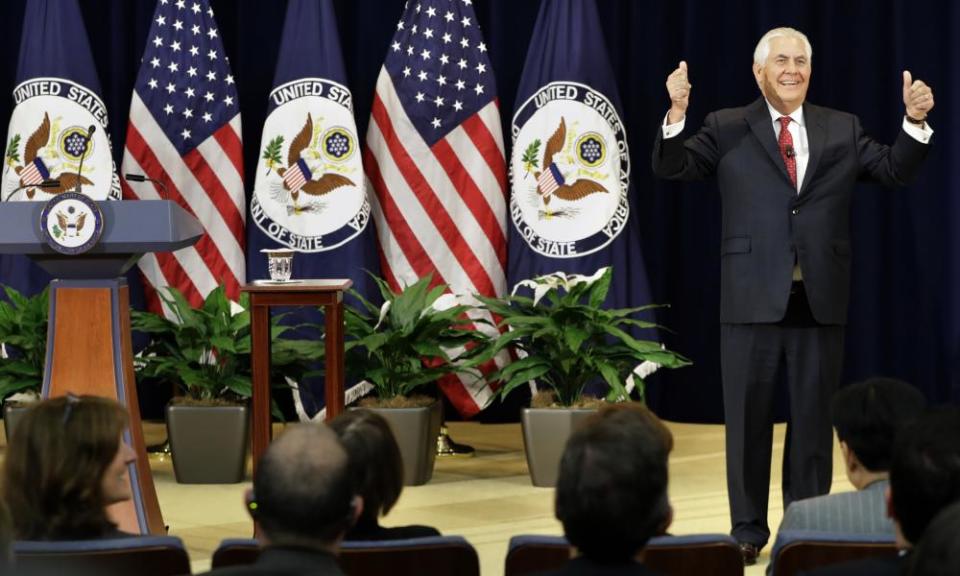Rex Tillerson: 'America first' means divorcing our policy from our values
Speech describes ‘obstacles’ to national security interests, but former official says it shows secretary of state is ‘clueless’
The US secretary of state, Rex Tillerson, has said Donald Trump’s “America first” approach to the world means decoupling US foreign policy from values such as human rights and freedom.
Addressing state department diplomats and staff, Tillerson said there were times when insistence that foreign countries abide by US values got in the way of the pursuit of national interests.
“I think it is really important that all of us understand the difference between policy and values,” the secretary of state, a former oil executive, said as part of what he described as an “overarching view” on Trump’s “America first” mantra.
“Our values around freedom, human dignity, the way people are treated – those are our values. Those are not our policies.
“In some circumstances, if you condition our national security efforts on someone adopting our values, we probably can’t achieve our national security goals,” Tillerson said. “If we condition too heavily that others just adopt this value we have come to over a long history of our own, it really creates obstacles to our ability to advance on our national security interests our economic interests.”
Although Tillerson stressed that “it doesn’t mean we leave those values on the sidelines”, and said that while policies changed, “our values never change”, the speech revived concerns first raised when he was nominated for the job, that he would approach US foreign policy in the same way he ran ExxonMobil.
Since he first described his “America First” policy on the campaign trail, Trump has been criticized for using a phrase denounced by the Anti-Defamation League for its links to 1940s Nazi sympathisers.
Tillerson’s comments drew a scathing response from former US state department officials.
“This is the most clueless speech given by a secretary of state in my lifetime,” said Tom Malinowski, former assistant secretary of state for democracy, human rights, and labour. “Clueless of what came before him, and of how US foreign policy has changed in the post-cold war era; clueless about what the world expects of America, including that we defend universal values and norms; clueless about what the people he is supposed to lead actually do and the harm being done to their mission and morale by by his cluelessness.
“The speech was like being told the amputation of your limbs will be good for you by a surgeon who skipped medical school,” Malinowski added.
John Kirby, the state department’s former spokesman tweeted: “Divorcing our interests from our values in foreign policy is like trying to plant cut flowers.”

It was Tillerson’s second policy speech at the state department since starting the job at the beginning of February, and it came at a time of deep distrust among his staff that he had failed to protect the department from cuts of up to 30% to US diplomacy and foreign aid proposed by the White House.
Tillerson said he was keen to hear the views of state department employees on how the organisation should be remodeled and modernised to meet a new global environment, but he took no questions on Wednesday. State department staffers have complained privately that he should have consulted staff on how to remake the state department before backing job cuts of up to 2,300.
In his speech on Wednesday, he made no direct reference to the cuts but suggested that the state department had lost its way over previous decades.
“We just kind of lost track of how we were doing it, and I think things have gotten out of balance,” Tillerson said.
He said the biggest foreign policy challenge was North Korea, and he said the administration was “leaning hard into China to test their willingness to use their influence” over Pyongyang.
He noted that relations with Russia were at a low and said there were multiple efforts underway to “stabilise the relationship” with Moscow. The first priority was to explore whether the two countries could cooperate in Syria. The US sent a senior diplomat to Moscow-brokered talks in Astana, Kazakhstan, which began on Wednesday. The armed opposition, however, suspended its participation on the first day, in protest against continued government bombing of rebel-held areas.
“I don’t want to say we are off to a great start on this,” Tillerson said. “It’s in its very early stages and I don’t know where it will go.”

